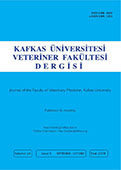
This journal is licensed under a Creative Commons Attribution-NonCommercial 4.0 International License
Kafkas Üniversitesi Veteriner Fakültesi Dergisi
2018 , Vol 24 , Issue 5
Some Characteristics of Erzincan Tulum Cheese Produced Using Different Probiotic Cultures and Packaging Material
1Food Engineering Department, Faculty of Engineering, Afyon Kocatepe University, TR-03200 Afyonkarahisar - TURKEY2Food Engineering Department, Faculty of Engineering, Afyon Kocatepe University, TR-03200 Afyonkarahisar - TURKEY
3Food Engineering Department, Graduate School of Natural and Applied Science, Afyon Kocatepe University, TR-03200 Afyonkarahisar - TURKEY
4Food Engineering Department, Faculty of Engineering, Afyon Kocatepe University, TR-03200 Afyonkarahisar - TURKEY DOI : 10.9775/kvfd.2018.19596 In this study, Erzincan tulum cheeses produced using pasteurized sheep milk and probiotic bacterial cultures were filled in different packaging materials (skin bag, intestine, and appendix) and stored for 90 days. Subsequently, the chemical, microbiological and quality criteria of the samples were examined on the 2nd, 30th, 60th and 90th days of the storage period. Although the acidity values of cheese samples increased during the storage period, the pH and water activity values decreased. Similarly, TAMB, TAPB, yeast/mold, lactic acid bacteria, lipolytic bacteria, proteolytic bacteria, Lactococcus spp. and Pseudomonas spp. counts increased; however, the total coliform and Enterobacteriaceae counts decreased. The probiotic culture counts added in cheese production also decreased during storage. Moreover, no Escherichia coli, Staphylococcus aureus, Salmonella spp., Listeria spp. and Brucella spp. development was determined in the samples. Keywords : Erzincan tulum cheese, Probiotic bacteria, Appendix, Small intestine, Quality criteria











